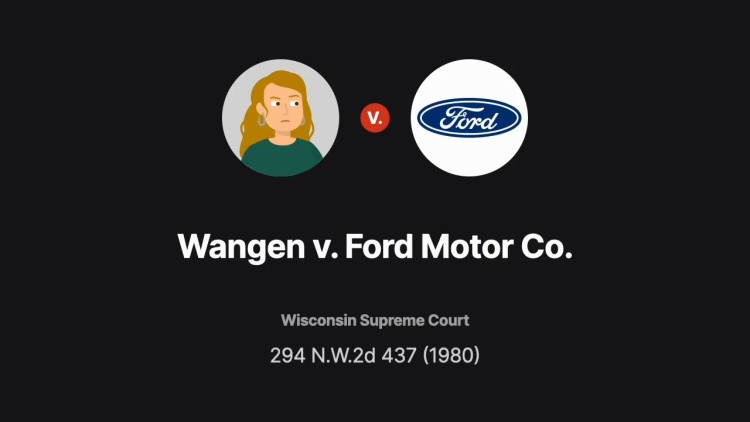Wangen v. Ford Motor Company
Wisconsin Supreme Court
97 Wis. 2d 260, 294 N.W.2d 437 (1980)

- Written by Josh Lee, JD
Facts
Terri Wangen and other individuals (plaintiffs) were involved in an automobile collision between a Ford Mustang (Mustang) and another car. The Mustang’s fuel tank ruptured, causing a fire that killed or severely injured all of the Mustang’s occupants. The plaintiffs commenced action against Ford Motor Company (Ford) (defendant). The plaintiffs sought punitive damages, alleging that Ford knew of the defects in the Mustang that had caused the plaintiffs’ burns but chose to conceal the defects rather than undergo the expense and bad publicity of a recall. Ford filed a motion to dismiss the complaint, arguing that punitive damages were not available for products-liability cases based on strict liability or negligence. Ford argued that punitive damages were only available for intentional, personal torts, because punitive damages were based on the defendant’s intentional conduct. In support, Ford argued that in product-liability cases: (1) compensatory damages operate as sufficient punishment and deterrence; (2) punitive damages will simply result in higher costs to the public, as sellers will pass the costs on to customers; (3) punitive damages are unnecessary to incentivize plaintiffs to bring suit, because compensatory damages are sufficient incentive; and (4) punitive damages will have undesirable consequences, such as the punishment of innocent shareholders if the cost cannot be passed to customers, as well as windfalls to earlier plaintiffs. The trial court denied Ford’s motion to dismiss, and the court of appeals reviewed the denial in an unpublished decision. The state supreme court considered the appeal.
Rule of Law
Issue
Holding and Reasoning (Abrahamson, J.)
What to do next…
Here's why 911,000 law students have relied on our case briefs:
- Written by law professors and practitioners, not other law students. 47,100 briefs, keyed to 997 casebooks. Top-notch customer support.
- The right amount of information, includes the facts, issues, rule of law, holding and reasoning, and any concurrences and dissents.
- Access in your classes, works on your mobile and tablet. Massive library of related video lessons and high quality multiple-choice questions.
- Easy to use, uniform format for every case brief. Written in plain English, not in legalese. Our briefs summarize and simplify; they don’t just repeat the court’s language.








